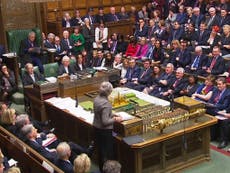Delaying Article 50 is the only option left on the table for Theresa May
Not only can the House of Commons not decide what to do about Brexit, but it cannot even decide how it will, so to speak, fail to come to a decision about what to do about Brexit
Any curious member of the public with an interest in the future of the country who followed proceedings in the House of the Commons today would be excused for wondering what on earth was going on. Having sat through the usual banter at prime minister’s questions, there was supposed to be the “great debate” about the government’s agreement with the EU.
In that context, the viewer might have come prepared to endure some challengingly abstruse arguments about the differences between, say, “the” and “a” customs union, or the constitutional novelty of the “Stormont Lock”, or whether and how Article 50 might be paused or revoked, and much more besides. All necessarily difficult, but all obviously vital.
Instead, members of the House of Commons, led by the leader of the house, Andrea Leadsom, spent more than an hour – longer than prime minister’s questions – on points of order about procedure. Admittedly the issue was crucial – as it would affect the timings of when the government would need to come back with fresh proposals if its current policy fails – but the process of discussing procedure was repetitive and disproportionately time consuming, as well as utterly incomprehensible, more so even than Brexit itself. Jacob Rees-Mogg asked what the meaning of “forthwith” is in parliamentary language, and the public switched off – forthwith. Should a backbench “rebel” amendment, in this case laid by pro-Remain Tory MP Dominic Grieve, be allowed on a government business motion? Is precedent inviolable? Has the speaker lately driven a car with a derogatory sticker about Brexit on the back of it? Is Ms Bercow (whose car it is) entitled to her views?
Or, as any sane voter should ask, who cares? Why cannot the issues of substance be addressed properly, and forthwith?
So not only can the House of Commons not decide what to do about Brexit, but it cannot even decide how it will, so to speak, fail to come to a decision about what to do about Brexit. So much for the sovereignty of parliament. So much for taking back control. So much for putting the national interest first. As it happens the amendment was passed by the Commons (they didn’t have to) and parliament has asserted its rights.
As an exercise in Bercow-baiting it was sans pareil; as an attempt to settle the country’s relationship with Europe it was a bit of a debacle.
Even so, the Commons has come to one fairly clear conclusion – that there is no majority in parliament for a so-called no-deal Brexit, or, to put things more favourably to it, to trade with the EU under World Trade Organisation terms after 11pm on 29 March.
The amendment to the Finance Bill was not in itself sufficient to deprive the state of income and prompt a Trump-style government shutdown. It is, though, a very clear statement of purpose by the overwhelming cross-party majority against the no-deal option. Those who actively campaign to achieve such a “clean” result are entitled to continue to do so; but the fact of political life is that no deal is dead. It may, as Boris Johnson suggests, be closest to what the public voted for in the 2016 referendum – but it is not going to happen. Probably.
The options, then, for Theresa May are closing in. She is getting little substantive help from Brussels, Dublin, Berlin or Paris to appease her rebellious colleagues, and the prospect of no-deal Brexit is growing, mercifully more distant, even though it remains the legal default option if a deal of some sort cannot be concluded; or some other exit from the maze is discovered.
There are two such possibilities, and both involve handing the mewling, messy baby Brexit back to its absentee parents, the British electorate.
Labour is at least consistent, if disingenuous, in insisting on a general election. It could happen, but it seems unlikely. A motion of no confidence in Her Majesty’s government is one of the few things that would unite Ms May’s crazed army. Jeremy Corbyn is not going to get to No 10 by that route. In any case, the chances are that an election would result in a hung parliament, which would resolve nothing as far as Europe is concerned.
Even if Labour won an overall majority it is not obvious that the EU would offer a radically different deal, and even if they did, there would still be a democratic imperative for the British people to have a Final Say on the terms of Brexit. This, sometimes, Mr Corbyn acknowledges.
The more obvious solution to the parliamentary impasse would be for the public to have a vote on the terms of our exit. The EU has indicated that a delay to Article 50 would be in order for this to take place, and parliament is free to vote for it. It has little choice. No doubt there will be many more points of order along the way, and incomprehensible wrangling about the meaning of Commons standing orders and page 458 of Erskine May, and plenty of chants of “scum” round Westminster, but it is the right thing to do and the inevitable thing to do. It will take many months to get right. We need to get on with it. Forthwith.



Join our commenting forum
Join thought-provoking conversations, follow other Independent readers and see their replies